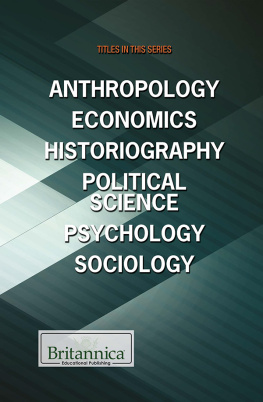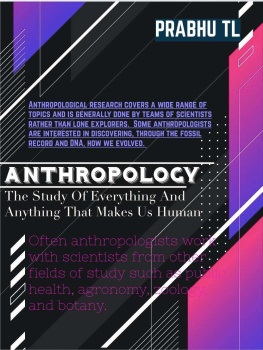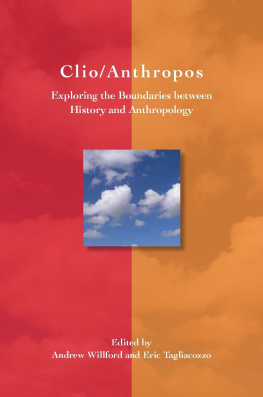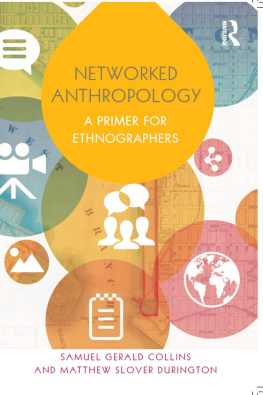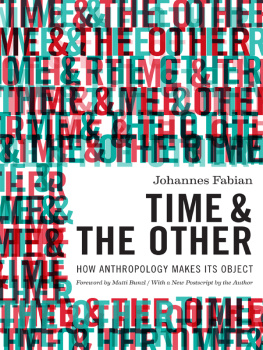Clio/Anthropos
Exploring the Boundaries between History and Anthropology
Eric Tagliacozzo
Andrew Willford
Stanford University Press
Stanford, California
2009 by the Board of Trustees of the Leland Stanford Junior University. All rights reserved.
No part of this book may be reproduced or transmitted in any form or by any means, electronic or mechanical, including photocopying and recording, or in any information storage or retrieval system without the prior written permission of Stanford University Press.
Printed in the United States of America on acid-free, archivalquality paper
Library of Congress Cataloging-in-Publication Data
Clio / anthropos : exploring the boundaries between history and anthropology / edited by Andrew Willford and Eric Tagliacozzo.
p. cm.
Includes bibliographical references and index.
9780804772402
1. Ethnohistory. 2. Anthropology and history. I. Willford, Andrew C. (Andrew Clinton) II. Tagliacozzo,
Eric.
GN345.2.C55 2009
909.04dc22 2008053333
Typeset by Westchester Book Composition in Adobe Garamond, 10.9/13
Acknowledgments
We are delighted that this book is appearing in print after what seems like a long time since its inception. The impetus for the volume came through a small workshop organized on this topic at Cornell University. Seven of the essays appearing here originally came to us through this venue; we are grateful to Patricia Spyer for presenting her ideas at the workshop, though her essay did not appear in the final volume. Danilyn Rutherford stepped in with a contribution that admirably filled this void, so we were delighted to be able to welcome her into the fold. Noa Vaisman was a terrific student-helper for the workshop, and we thank her profusely, as we thank Margaret Rolfe, Barb Donell, and Bonnie Blanding-May, who helped with various organizational matters. Our colleagues in history and anthropology, Sandra Greene, Tamara Loos, Jane Fajans, Terry Turner, and David Holmberg, also agreed to act as discussants during the workshop, for which we thank them very much. Finally, we wish to thank the many funding bodies at Cornellthe East Asia Program, the Southeast Asia Program, the South Asia Program, the Einaudi Center, the Society for the Humanities, and the departments of history and anthropology, all of whom supplied funds so that the workshop could happen. It would not have occurred without these generous grants.
We wish to thank Muriel Bell, Jennifer Hel, and Joa Suorez at Stanford University Press for their patient editorial and organizational efforts. Working with them was a great pleasure, and we think they have made the book better through their interventions. Jane Ferguson and Tom Patton helped us to prepare the manuscript for publication. We wish to thank Rosalind Morris for reading the entire manuscript. Her generous advice and masterful critique proved invaluable. We also thank the anonymous referees for the press who encouraged us in their rigorous and insightful reviews. They helped us to sharpen and tighten the project while also helping us to see which critical questions could be extended. Finally, our greatest debts are to our families: Vasantha, Rabin, and Anisha, and Kathy, Clara, and Luca, who sustained us through the long editorial process and into publication. We hope this book will suggest not only the breaking of some old paradigms, but the creation of some new ones as well. If the book makes that contribution to our respective literatures and to knowledge in general, we will be very glad indeed.
1 History and Anthropology: Strange Bedfellows
Eric Tagliacozzo and Andrew Willford
Academic disciplines, like political regimes, seem to generate their most assertive moments of self-rationalization when they perceive themselves to be responding to a crisis that casts doubt on the foundations upon which they stand. Academic and political processes are, of course, not simply parallel formations or the product of an odd juxtaposition. Rather, they are mutually constitutive forces in the workings of modernity. That is, the production of disciplines, cultures, and archives are part of the workings of power. This very observation has inspired much historical ethnography. The present volume recognizes and builds upon this understanding of power and knowledge but also suggests further that an unsettling of academic disciplinarityas one possible response to a perceived crisis of knowledgeopens up new opportunities for examining the inner workings of power, culture, and the archive. Put boldly, the authors in this volume, in varied ways, use the interdisciplinary boundaries of history and anthropology to reveal the contingencies of knowledge-production. By this we refer not only to the terminologies of expertise that produce disciplinary knowledge and evidentiary-based truth claims but also to the servicing of such truths in the name of political and cultural projects. Several of the essays in this volume reveal a parallel between the workings of cultural and political knowledge and the dynamic logic of the interstitial boundaries that animate disciplinary truths in academic life. In turn, this revelation proves particularly useful for producing a critique of the contradictions and contingencies within political identifications and ideologies, particularly within the various spaces of the colonial and postcolonial world.
The recent so-called crisis of representation in the social sciences (and, increasingly, in the humanities as well) has made crossing disciplines more and more common in history and anthropology. A sense of persisting urgency has been lent to this process by the publication of several seminal texts, such as Edward Saids Orientalism (1978) and Clifford and Marcuss Writing Culture (1986), and by the growth of the Subaltern, Postcolonial, and Cultural Studies fields since that time. These critiques have refashioned scholarship primarily on the non-Western world, yet their combined influence has also been felt strongly in studies on Europe and North America. Anthropologists and historians alike have been grappling with these changes in vantage and representation and have increasingly been looking toward each others methods for answers on how to proceed. The present volume aims to tease out and explain the ramifications of each of these disciplines cadences increasingly turning toward each other for inspiration and for authorization. We were specifically interested in rethinking the relationship between power and culture, in reevaluating ideas and concepts of incorporation and resistance, and in examining hegemony and history in an increasingly asymmetrical global system.
As Nicholas Dirks has suggested, the imbrication of history and anthropology emerged at a time when the colonial state changed from a revenue state to an ethnographic state (2002: 56). Dirks argues that the colonial state authorized an ethnographic imperative to know its subjectsthat is, to archive through an explosion of writings and classifications about caste and various other barbaric native practices. As an ethnographic archive and as a primary historical source, the state, he suggests, produces, adjudicates, organizes, and maintains the discourses that become available as the primary texts of history (2002: 59). In a word, the ethnographic archive became a principal form of governmentality at the same time that governmentality expressed itself through the categories of historical thought and writing (61). The sedimentation and classification of knowledge, in other words, took place through ethnographic practice, a legacy of historical anthropologizing that is troubling, to say the least. Dirks reminds us, as have many Subaltern Studies scholars, that the archive already bears the traces of the states anxious regimes of classificatory knowledge-production in all cases.


